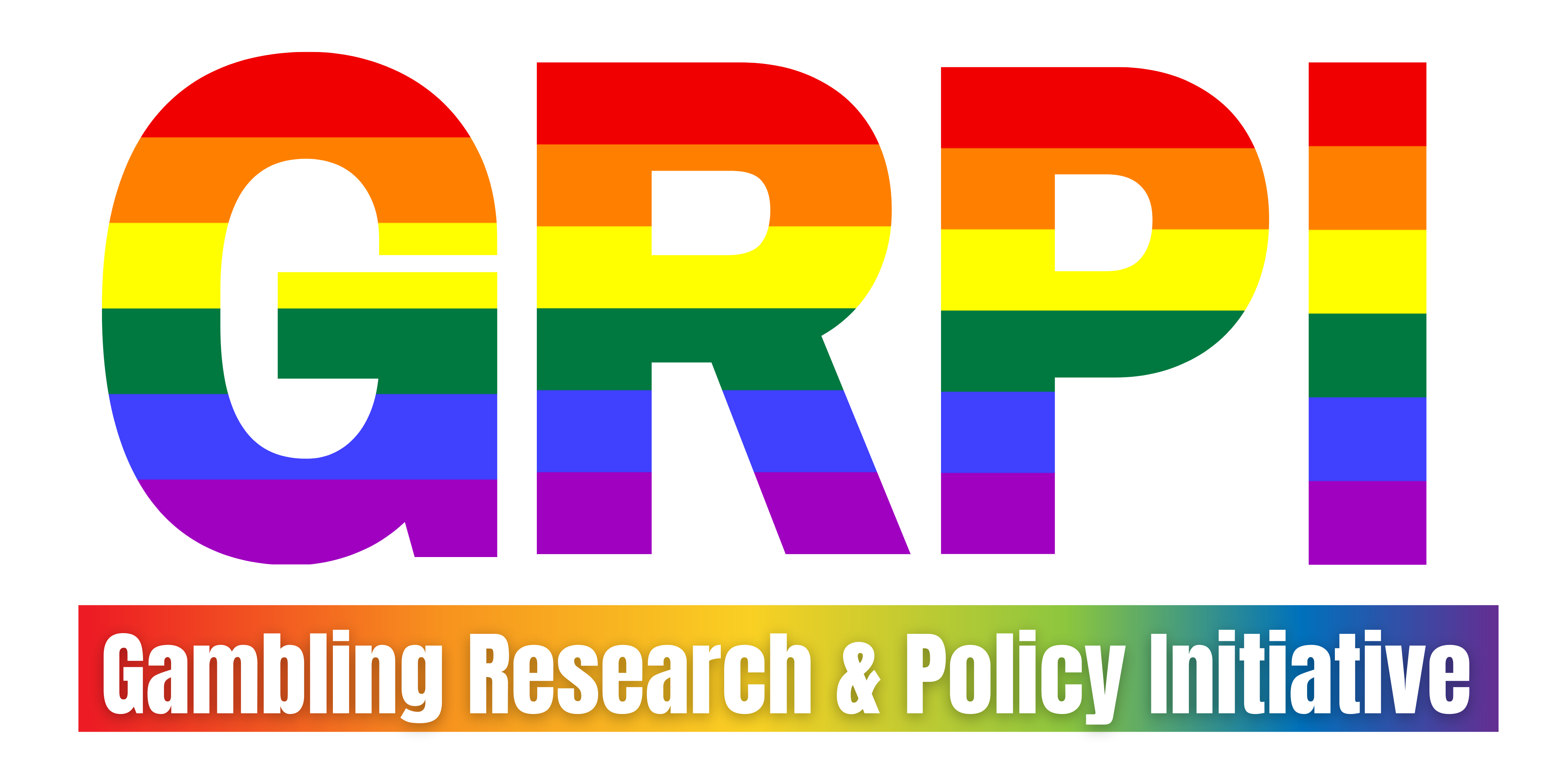LGBTQ+ & Gambling Disorder

LGBTQ+ & Gambling Behavior & Risk
GRPI current research on LGBTQ+ & gambling include:
- Does legality matter? Understanding LGBTQ+ gambling behavior & risk among four states with different levels of gambling legality
- Comparative (US/UK) study of gambling behavior and risk among LGBTQ+ individuals
- National study of the relationship between life experiences and addiction (substance use and gambling) among individuals who identify as transgender/non-binary
Excerpts from GRPI’s Director Dr. Michelle L. Malkin’s entry in the forthcoming Sage Encyclopedia of LGBTQ+ Studies (2nd Edition, 2024)
“Why LGBTQ+ may be at Risk for Gambling Disorder
LGBTQ+ individuals at risk for other substance addictions may gamble due to a lack of self-control or as a co-occurring disorder with drugs, alcohol and/or tobacco use. It is believed that stigma and tension from being a member of a marginalized community may lead to the increased risk for addictive behaviors. Issues members of the LGBTQ+ community face that may result in increased strain include lack of access to adequate and culturally competent healthcare; discrimination in employment, housing, bullying/violence, and education. Research shows that LGBTQ+ people experience higher rates of depression and anxiety than non-LGBTQ people and individuals who identify as sexual or gender minorities face social stress due to societal prejudice and discrimination.
This in turn may result in negative behaviors due to poorer mental health, as well as comorbidities with mental health issues. LGBTQ+ individuals are reported to experience mental health issues at a higher rate than the general population. Lack of access to culturally competent health care and counseling services increases the potential for people within the LGBTQ+ community to fear or be reluctant to seek help, thereby resulting in addictive behaviors for self- medicating or escaping from social stressors and disparities in physical and mental health.
LGBTQ+ Rates of Gambling and Disorder
Issues around problem gambling with the LGBTQ+ population are vastly understudied. Less than nine known studies are currently published. While there is some disagreement among the studies, the majority have found that some populations within the LGBTQ+ community may gamble at higher rates than their heterosexual counterparts, and at least some LGBTQ+ individuals are at an increased risk for problem gambling. There is disagreement among the currently published studies on whether men who have sex with men (MSM) have a higher, equal, or lower prevalence of Gambling Disorder than heterosexual men. Adult women who have sex with women (WSW), however, have consistently scored as both participating in gambling behavior and having Gambling Disorder at higher rates than heterosexual women. Therefore, WSW may specifically be at a higher risk for problem gambling among all sexual minority individuals. There is also some evidence that gambling disorder may affect older LGBTQ+ adults at a disproportionate rate than their heterosexual counterparts.
As for understanding gambling behavior and the prevalence of gambling disorder among transgender individuals, only one study assesses gambling behavior among transgender individuals, focused specifically on transgender adolescents. Transgender adolescents assigned male at birth were most at risk for gambling involvement and problem gambling. While not as highly at risk as trans individuals assigned male at birth, those assigned female at birth were also at a higher risk for problem gambling than cisgender males and females. Overall, over 11% of transgender adolescents met the criteria to be further assessed, while only 4.1% of those identified a cisgender.
Suicide Risk
Factors that may lead LGBTQ+ individuals toward Gambling Disorder may lead to an increased suicide risk among LGBTQ+ people. This is especially alarming given the high suicide rate for LGBTQ+ individuals and separately among problem gamblers. The suicide rate for problem gambling is the highest of all addictions, at nearly 20%. Assessment for gambling behavior and risk among LGBTQ+ individuals seeking health and mental health care may help reduce the high prevalence of suicide among this population.”
Suggested Additional Readings
- Baxter, C. (2022). Gambling prevalence and problem gambling in LGBTQ2+ communities. Greo [Online] Found 7/6/22 at https://www.greo.ca/Modules/EvidenceCentre/Details/gambling-prevalence-and- problem-gambling-in-lgbtq2-communities.
- Birch, P., Ireland, J. L., Strickland, C. R., & Kolstee, J. (2015). Examining Problematic Gambling and Mental Health in a LGBTI community: A preliminary study. Medical Research Archives, (3), 1-8.
- Broman, N., Prever, F., di Giacomo, E., Jiménez-Murcia, S., Szczegielniak, A., Hansson, H., & Håkansson, A. (2021;2022;). Gambling, gaming, and internet behavior in a sexual minority perspective. A cross-sectional study in seven european countries. Frontiers in Psychology, 12, 707645-707645.
- Bush, R., Russell, A. M., Staiger, P. K., Waling, A., & Dowling, N. A. (2021). Risk and protective factors for the development of gambling-related harms and problems among Australian sexual minority men. BMC Psychology, 9(1), 1–18.
- Grant, J. E., & Potenza, M. N. (2006). Sexual orientation of men with pathological gambling: Prevalence and psychiatric comorbidity in a treatment-seeking sample. Comprehensive Psychiatry, 47(6), 515–518.
- Lee, B. N., & Grubbs, J. B. (2023). Problem gambling within sexual and gender minorities: A systematic review. Addictive Behaviors, 144, 107742.
- Malkin, M. L. & Stacey, M. (2023). Gambling Behavior Among LGBTQ+ Individuals: The Role of Gender and Gender Identity. Journal of Gambling Studies, 1-24. [link to article]
- Mathy, R. M. (2003). Transgender identity and suicidality in a nonclinical sample: Sexual orientation, psychiatric history, and compulsive behaviors. Journal of Psychology & Human Sexuality, 14, 47–65.
- Richard, J., Martin-Storey, A., Wilkie, E., Derevensky, J. L., Paskus, T., & Temcheff, C. E. (2019). Variations in gambling disorder symptomatology across sexual identity among college student-athletes. Journal of Gambling Studies, 35, 1303–1316.
- Rider, G.N., McMorris, B.J. Gower, A.L, Coleman E., Eisenberg M.E. (2019). Gambling behaviors and problem gambling: a population-based comparison of transgender/gender diverse and cisgender adolescents. Journal of Gambling Studies 35: 79-92.
- Stanmyre, J. F., Nower, L., & Malkin, M. L. (2023). Problem Gambling and Sexual Minority Individuals: Evaluating Influence of Age and Comorbid Mental Health and Substance Use Problems. Journal of Gambling Studies, 1-13. [link to article]